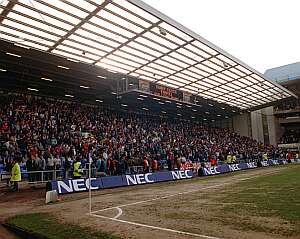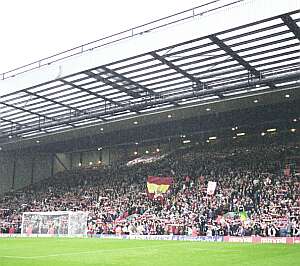|
In broad commercial terms, the move makes perfect sense. The cost of building a vast new stadium is astronomical – and if both clubs have it in mind to move to such venues, then sharing the costs will clearly reduce the burden on both clubs. Once more, once it is built, the clubs will share stadium staff, thereby reducing overheads. A shared stadium might well prove bigger than either club could afford on its own, increasing gate receipts, the possibility of the stadium being used for pop concerts – and the list goes on.
Yet for all that it might make sense in the boardroom, it is unlikely to receive universal support on the streets of Liverpool. Like all great rivals, the two Liverpool clubs have a fierce rivalry, and a staunch independence. Sharing anything with the enemy – be it success, a stadium, or anything else – goes against the grain.
Essentially, the scheme amounts to the clubs helping each other to be successful. But that’s not what the clubs have been about, ever since Everton walked out on Anfield to set up at Goodison Park, and Liverpool was established to replace them. Most Everton fans have no desire to see Liverpool do well. Most Liverpool fans have no desire to see Everton do well.
In fact, in many cases they actively want to see the other team do badly. If Liverpool had nothing to play for, and a win for their opponents could send Everton down, then many reds would be quite happy to see their team lose. It’s a similar mentality to that which often pervades the relationship between Burnley and Blackburn, or any of the other famous rivalries in this country.
|
In many ways it is the one thing that stays constant at a club – players and directors come and go, fans hang about for longer, but the ground is there throughout. It is so tightly intertwined with a club that the two become synonomous: can you every imagine Burnley leaving Turf Moor?
Of course, much of this no longer holds anyway, with many clubs already residing in smart new stadiums. The likes of Bolton, Man City and Huddersfield have already abandoned their spiritual home in favour of space-age grounds. People do point to Italy where ground shares are an established part of the culture – the Milan clubs are massive rivals, yet they share the San Siro quite happily.
But – and maybe this is a bit unrealistic – I still have a thing about the old grounds, with all their quirks. I don’t particularly like the Reebok stadium or The McAlpine. I find them a bit lacking in something. For all their impressive design and comfort, I prefer the tightly hemmed in grounds near town centres – like Goodison Park, or Highfield Road, Coventry. And I think the names of the famous grounds – like White Hart Lane, The Hawthorns, Maine Road and the like – are indicative of the nature and ethos of English football. It is, in so many ways, an entirely different culture to Italy or anywhere else. What works there doesn’t necessarily work here.
Unfortunately, they belong to a bygone age. They don’t have a place in the desperate scramble to keep up with the global leisure corporation that is Manchester United. It is, in truth a futile scramble, unless of course you’re Chelsea and have a shady Russian billionaire to back you.
But they will continue to try and break that monopoly. And to do that, they will try absolutely anything. Perhaps that’s fair enough. But it’s a shame that in order to bring a bit of competition to our game, we have to embrace unknown billionaires who fancy a plaything, or lose a bit of heritage along the way. But sadly, it seems to be a recurring theme. Bring on the Packard Bell City Liverpool Docklands Stadium.


